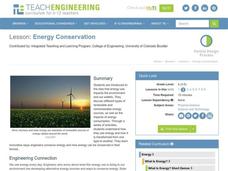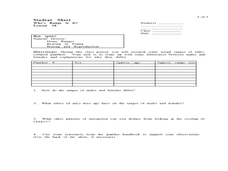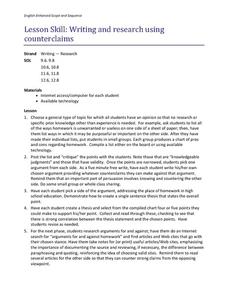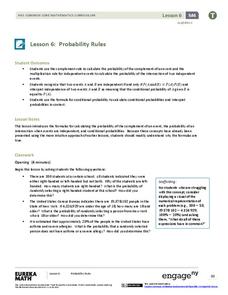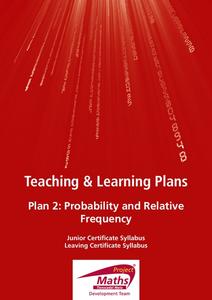Curated OER
When A Car Coughs. . .
Budding scientists collect and compare particulate exhaust from four different vehicles. They discuss how cars contribute to air quality. To get the most mileage out of this resource, have learners complete the optional step 5, in which...
Curated OER
How Big is Big?
Geography learners compare and contrast population densities throughout the world. Using maps, they estimate the relative size of the world's regions and populations. They develop analogies to discover the world they live in and...
Curated OER
Energy Conservation
Students investigate energy conservation. In this energy conservation and analyzing data lesson, students identify and explain several energy sources and research renewable and nonrenewable energy sources. Students use statistics...
Curated OER
Who's Range is it?
Students investigate the habits of panthers by analyzing radio transmitted data. In this animal life lesson plan, students utilize computers to view the range of different statistics dealing with Florida panthers. Students...
Curated OER
Fun Faces of Wisconsin Agriculture: Curley's Beef Fast Facts
Students explore animal slaughter by researching the Wisconsin beef industry. In this meat statistics lesson, students practice using different math functions to identify how many burgers or sports equipment can be made from one...
Indiana Science
How Many E’s?
Seventh graders explore random sampling by estimating the number of e's on the newspaper. They explain the possible error sources for this type of sampling, and compare the accuracy of sampling a small and large population. This is a...
National Wildlife Federation
Plastic in the Sea
How much plastic do people use? Class members identify how plastic is involved in their daily lives by looking at food packaging either at a grocery store or at home. Learners view statistics for the amount of plastics found on a beach...
Virginia Department of Education
Writing and Research Using Counterclaims
Introduce your high school scholars as to how to use counterclaims in argument writing. Learners explore this skill with collaborative efforts and technology. Together they explore the pros and cons of homework and develop a thesis for...
PBS
Technology: Conveniences and Consequences
It's a delicate balance—using technology to improve our lives while still protecting the environment, and ourselves, from the hazards of technology use. Class members examine statistics about the increase in media use, complete a survey...
Willow Tree
Mean, Median, and Mode
Statistics are more than just numbers—they can give you important information about a set of data. Pupils learn how to find the mean, median, and mode of a data set. They also find the next score to reach a desired mean.
Willow Tree
Data Sampling
Some say that you can make statistics say whatever you want. It is important for learners to recognize these biases. Pupils learn about sample bias and the different types of samples.
EngageNY
Calculating Conditional Probabilities and Evaluating Independence Using Two-Way Tables (part 2)
Without data, all you are is another person with an opinion. Show learners the power of statistics and probability in making conclusions and predictions. Using two-way frequency tables, learners determine independence by analyzing...
EngageNY
Events and Venn Diagrams
Time for statistics and learning to overlap! Learners examine Venn Diagrams as a means to organize data. They then use the diagrams to calculate simple and compound probabilities.
EngageNY
Probability Rules (part 1)
In statistics, probability rules—literally! Learners use their previous knowledge and explore a set of rules for conditional probability, independent probability, and complements. Given different scenarios, they must determine what type...
EngageNY
Sampling Variability in the Sample Mean (part 2)
Reduce variability for more accurate statistics. Through simulation, learners examine sample data and calculate a sample mean. They understand that increasing the number of samples creates results that are more representative of the...
EngageNY
Estimating a Population Proportion
Find the percent of middle schoolers who want the ability to freeze time. The 21st installment in a series of 25 has groups collect a random sample of respondents who answer a question about superpowers. Using sample statistics,...
California Department of Education
What’s A Hot Job?
What jobs are the next best thing? Curious career scholars explore their options in lesson three of a five-part series. Pupils research job trends and labor statistics before discussing the factors that influence occupation trends.
EngageNY
Contrasting Evidence: “Games Can Make a Better World” and “Video Games Benefit Children, Study Finds”
Anecdotes, analogies, testimonies, statistics. The most powerful arguments rely on multiple types of evidence. Scholars explore the topic as they read contrasting evidence about the benefits of video games. They complete Venn diagrams to...
Curated OER
How Diverse is That?
Compare various types of biological diversity in a coral reef and calculate a numeric indicator that describes the diversity found in coral communities. Your class can work in groups to look at the abundance and distribution data of...
Curated OER
Barbie Bungee
Middle and high schoolers collect and analyze their data. In this statistics lesson, pupils analyze graphs for linear regression as they discuss the relationship of the function to the number of rubber bands and the distance of the...
West Contra Costa Unified School District
Introduction to Conditional Probability
Here is a turnkey lesson that walks young statisticians through the development and uses of conditional probability. From dice games to surveys, Venn diagrams to frequency tables, the class learns how a given can effect the overall...
Federal Reserve Bank
Insurance Inventory
Do you have enough insurance? Pupils may be surprised to learn how much their possessions are worth. This activity asks them to create an inclusive list and make a comparison to their insurance coverage. According to the statistics, most...
Project Maths
Introduction to Probability
Take a chance with an activity sure to improve your class's skills. An introductory lesson focuses on probability and chance. It shows how probability is always a value between zero and one, i.e., the probability of an event is always...
Project Maths
Probability and Relative Frequency
It's all relatively simple once you get the gist. Young mathematicians learn about sample spaces and simple probability by conducting an activity with dice. To complete the second of six parts in the Statistics and Probability unit, they...
Other popular searches
- Data, Census, & Statistics
- Probability and Statistics
- Educational Statistics
- Baseball Statistics
- Math Statistics
- Climate Statistics
- Math Lessons Statistics
- Median and Mean Statistics
- Statistics Lesson Plans
- Sports and Statistics
- Probability Statistics
- Black Plague Statistics


